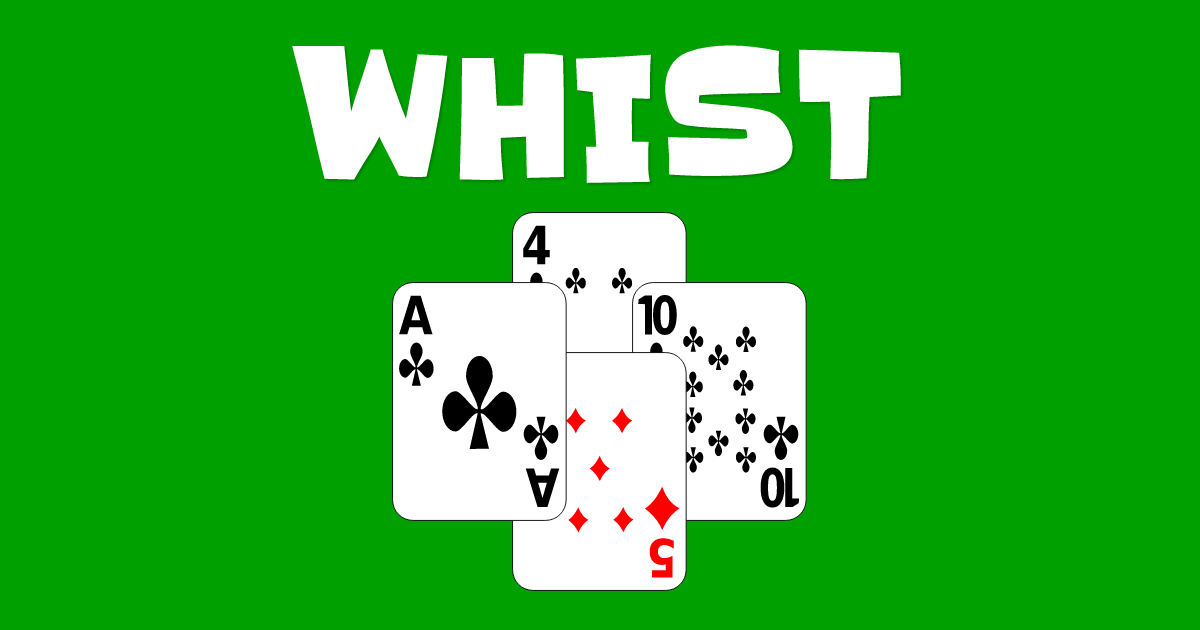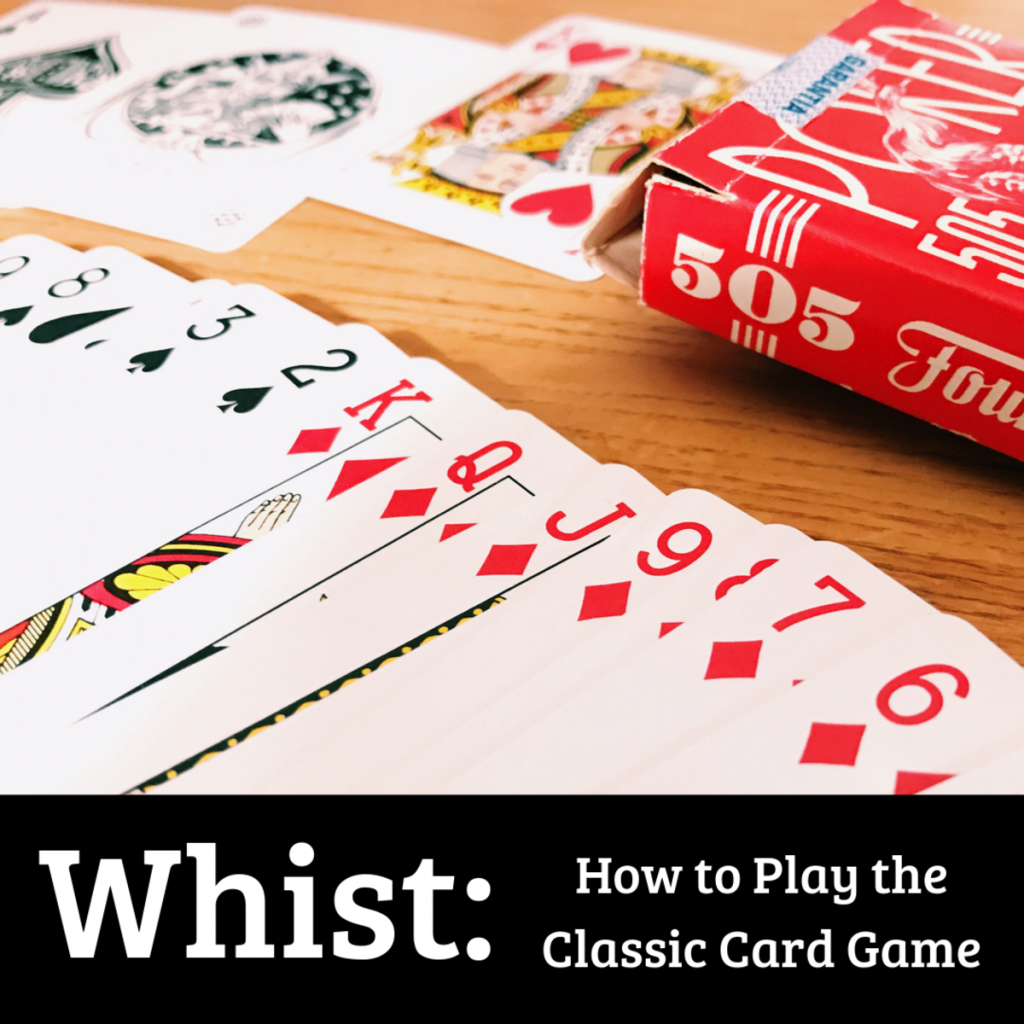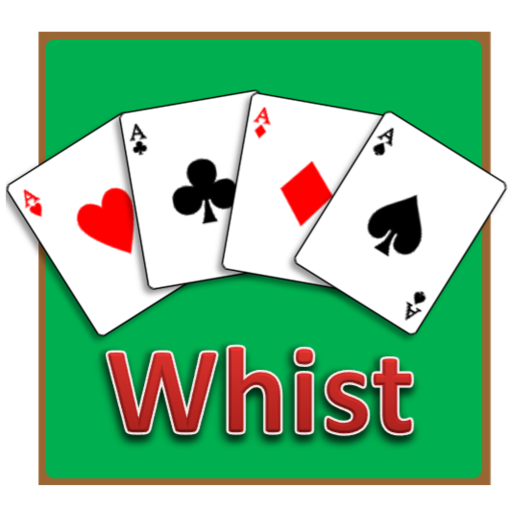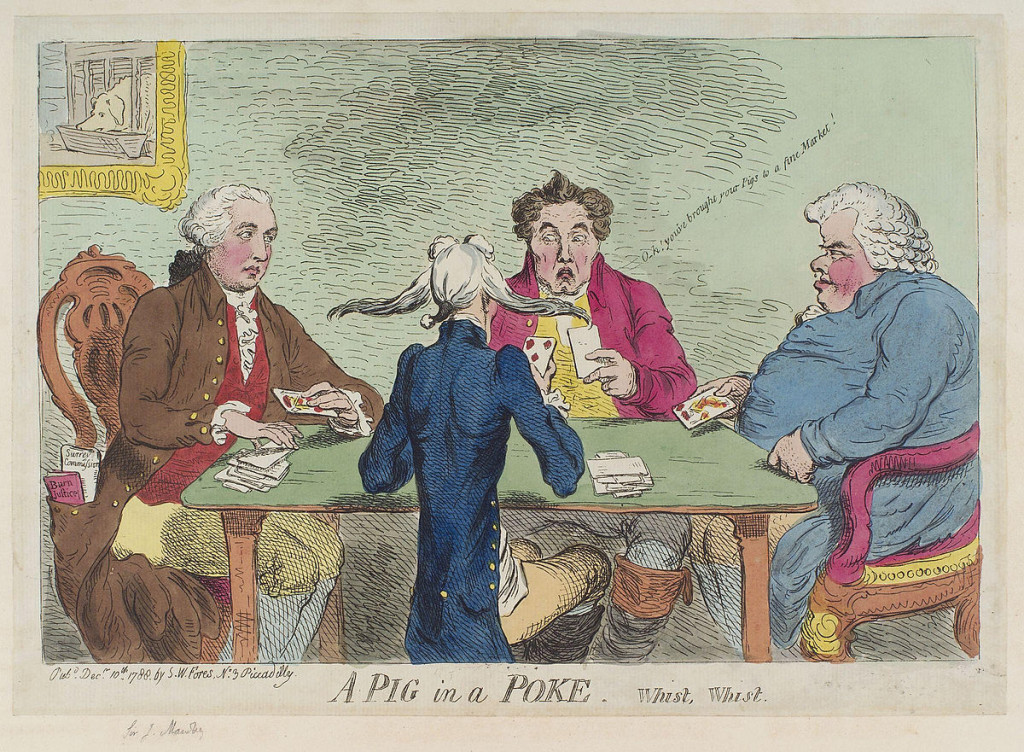
The card game Whist, whose history suggests that one of the earliest variants found in historical sources around 1529 was called “Triumph” (English: Trump – trump card).
From it later evolved “Ruff”, “Ruff and Honours”, “Whisk and Swabbers”, “Whisk” and finally the widely known Whist.
It is said that in the 19th century almost everyone knew and loved to play this game! Moreover, another game, Bridge, originated from “Vistas”.
Best online casinos offering games:
Materials needed for the game
The game is played with a traditional deck of cards – 52 cards. The card ranking order is standard – from highest to lowest – ace, king, queen, jack, ten, nine, and so on down to two.
Ideally, have 2 decks of cards so that while one deck is being played, the dealer can thoroughly shuffle and prepare the other for the next game.
How many players play?
Whist is usually played in pairs of two, so to have a fun time, you should gather a group of 4 friends.
Shuffling and dealing the cards
Players must sit so that members of the same team sit opposite each other. To determine the dealer and team players (if not agreed upon in advance), players draw 1 card each from the deck.
The player who draws the highest card becomes the dealer and plays on the same team with another player who also has a higher value card than the remaining players. His partner shuffles the cards thoroughly and hands them to the dealer.
It is also important to mention that during dealing, after dealing, or while playing, it is forbidden to hint to a team player about good or bad cards – penalties apply in such cases.
The dealer deals 13 cards to each player (cards are dealt one at a time). The last card belonging to the dealer is turned face up and placed on the table – it determines the trump suit for the game. It remains on the table until it is the dealer's turn to play.
How to play Whist?

The card game Whist begins with the player sitting to the left of the dealer and proceeds clockwise.
The player plays any card they wish. To win, each subsequent player must beat the played card with a higher card of the same suit, or if they do not have such a card – with a trump card.
If they do not have a trump card either, they play any other card. In this case, one must also consider their team partner, who may still win the point for the team.
Thus, the trick is won by the player who played the highest trump card, or if there are no trumps, the highest-ranking card. The right to start the next trick goes to the winner of the previous trick.
The won trick and its 4 cards are taken, turned face down, and placed in the middle between the pair of players. When a player from the other team wins a trick, they also turn the cards face down but place them crosswise to the opponent's cards to make it easier to count points later.
Additionally, it is very important to keep track of which cards have already been played to determine your next move, increasing your chances of winning future tricks. An exception to the rule is that a player who has won a trick is allowed to look at the cards played in the previous trick once, provided no trumps were played.
The game continues until all 13 tricks are played, and then the points are counted. If there are not enough points to win, a second and more rounds are played.
Scoring points
At the beginning of the game, it is agreed upon how many points the game will be played to. When all 13 tricks are played, it is counted which pair collected more of them. The winners receive 1 point. The game continues until one team reaches the required number of points.
Interestingly, in Great Britain, it is customary to play to 5 points, in America to 7, and a game to 3 points is also called “Short Whist”.
Additionally, in tournaments, players play for a limited time and must collect as many points as possible within that time.

When choosing to play a longer version of the game, it is played with each player's “honours”.
Some players ignore honours, while for others, it is a sign of luck, allowing them to be in a better psychological state and earn more points.
Additionally, a team that collects 4 highest-value trump cards (honours) – ace, king, queen, and jack – receives additional points. Those with 3 of these cards get 2 points, and those who collect all 4 get 4 points.
It is important to note that tricks are counted before honours, as honours cannot be the last points of the game. For example, if the game is played to 9 points, and the score is tied at 6 points. The player made 7 tricks and asked for honours.
He won 1 point, has a total of 7, and receives only 1 point for honours, so he does not immediately get the required total of 9 points.
Card game Whist strategy
Experts of this game suggest that the first card should be the strongest – in this case, your opponents will also play their best cards.
It is said that it is also good to play the card you have the least of or only a few from one suit, for example, if you have 4 spades, 4 hearts, 3 clubs, and 2 diamonds. It is best to play a diamond, hoping that your team partner will play a higher one.
The second player is better off playing a trump card – an ace or a king. With the ace, you will win immediately, and with the king, you will also have a good chance.
The third player, if the second player plays an ace, should play their lowest card, especially one from a suit they have the fewest cards in. The player can also play “modestly” and try to deceive the opponent. For example, the player holds the ace and queen of hearts (the previously played card is hearts) and knows that the opponent has the king.
They play the queen, perhaps losing, but in the next round, the chance of winning with the ace is almost 100%.
The fourth player usually plays the lowest card if they see that their pair has lost or plays the lowest trump card if their teammate has played a trump card that will win the trick.
So, one of the most important things in this game is the “communication” between the two team players and tracking the cards.
Whist Card Game Variants
As mentioned, the Whist card game evolved gradually and in various regions, so there are many variants of this game. You might find your favorite! For example,
- “Boston Whist” – mostly played in the 19th century in Europe. An interesting fact is that you can learn the rules of this game by reading Leo Tolstoy's epic historical novel “War and Peace,” in which the character Nikolai Rostov is very fond of “Whist.”
- “Bid Whist” – traditional Whist played with bets on who will win and for money. It is most commonly played in the United States.
- “Blob” – a game where the player guesses how many tricks each will take, and if they are wrong, they “sink” and lose points. It can be played with 4 or 5 players. Each player is dealt 6 cards. Additionally, the total number of tricks bid by all players cannot exceed 6. The player to the left of the dealer starts the game and sets (or can play without) trumps. Then the latter deals the cards.
- “Ace or Danish Whist” – includes several different “Whist” variants (e.g., “Solo Whist” and “Esmakker”), where the player chooses their partner by naming the ace of the desired suit. The game partner is revealed only as the “blind” game progresses and the player plays that ace. It is also played with 2 or 3 jokers, which can replace trump cards.
- “Catch the Ten” – also known as “Scottish Whist.” It is played with half a deck of cards, where tens are considered the most valuable cards.
- “Decreasing Cards Whist” – an English variant where players play individually rather than in pairs, betting each time cards are dealt on who and how many tricks will be taken. After a round, points are counted, and if the number of tricks bet is won, 10 bonus points are awarded! Additionally, with each new round, the number of cards in the deck is reduced by 4 – starting with 52, then 48, then 44, and so on until there are 4 cards left, and players make the final trick. Trumps are determined immediately after each new round in this sequence – hearts, clubs, diamonds, spades, then a round without trumps, a round where you lose 10 points if you miss the bet, then hearts, clubs, diamonds, spades, hearts, clubs, diamonds. Additionally, the total number of bets by players cannot exceed the total points of the round, so the dealer should ensure that all players are honest.

Less Known Variants:
- “Dutch Whist” – similar to the previously discussed “Whist,” where there are bets. In this variant, 7 players start playing with one card, but each time they play a round, they add 1 card and continue playing until the last round, where they have 7 cards. The next round is played without trumps (winning this round earns 5 points), then a “minus” round, where winning the round deducts 5 points, then a “blind” round, where players guess how many tricks will be taken. Then the game continues, but from 7 cards, it goes to 6, 5, 4, 3, 2, and 1. Trumps are determined before each game in this sequence – hearts, clubs, diamonds, spades. The game is played up to 10 points, with each round earning 1 point.
- “Double Whist” – often played in South Asia, where points are counted only when players win twice in a row.
- “Liar's Whist” – a variant where three players play with bets.
- “German Whist” – played by two players without bets.
- “Israeli Whist” – a variant where other players guess the number of tricks you will take.
- “Minus Whist” – a variant where a player is eliminated from the game if they do not win a trick.
- “Ninja Whist” – this variant is very similar to “Decreasing Cards Whist,” but it is played with jokers.
- “Serbian Whist” – a variant with guesses on how many tricks each player will take, but if guessed less or more, the point difference is deducted from the player's total score.
- “Solo Whist” – a variant where players bet that they will win 5, 9, or 13 points. If the bet is wrong, points are not counted.
- “Spades” – a variant where trumps are always spades throughout the game.
- “Arabic Whist” – played in Arab countries, where the winner chooses the trumps for the next game.





